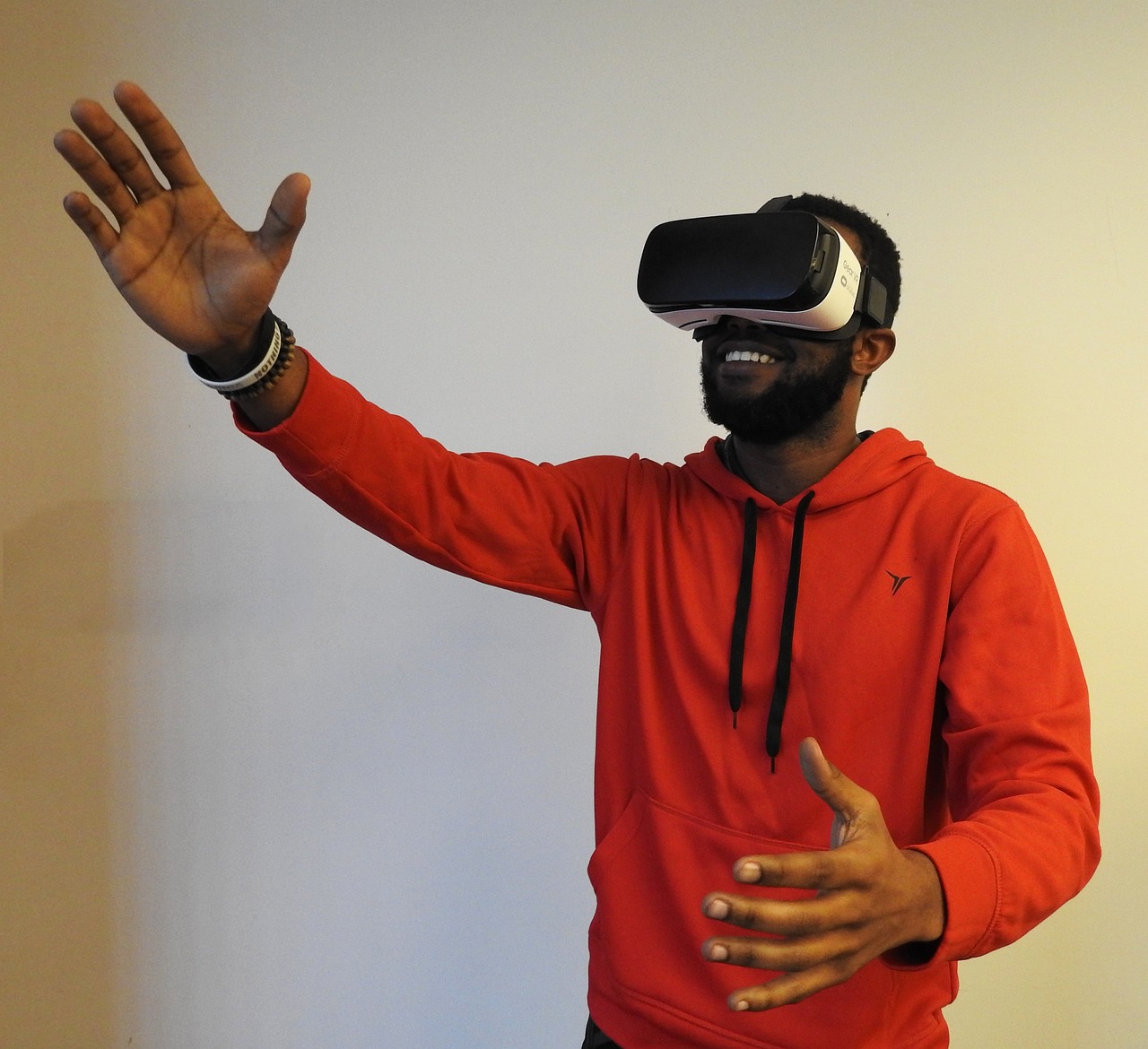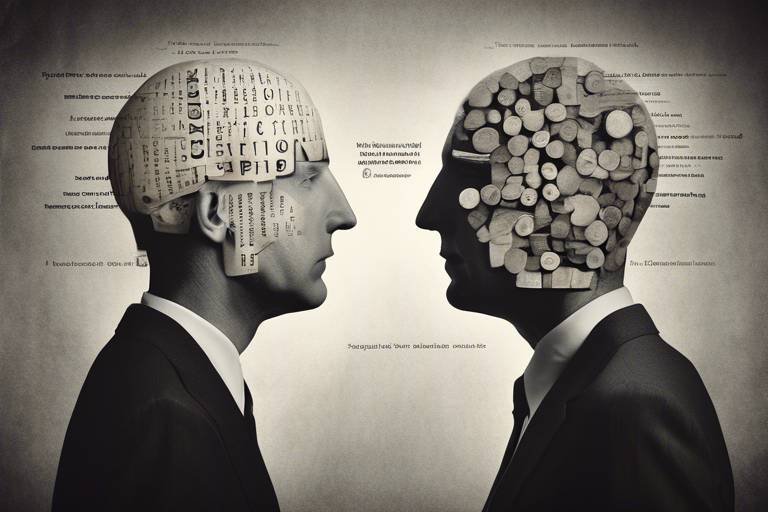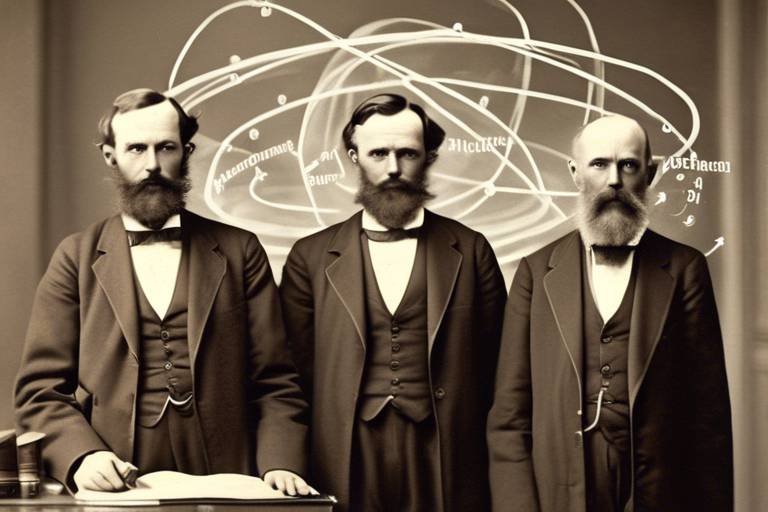The Unknowns - Philosophy Meets Quantum Science
Welcome to the fascinating world where philosophy and quantum science collide! It's a realm that not only challenges our understanding of reality but also invites us to question the very fabric of existence itself. Imagine standing at the edge of a cliff, peering into the vast unknown, where every scientific discovery feels like a stepping stone into a deeper, more complex understanding of our universe. This intersection is not just a theoretical playground for scientists and philosophers; it’s a profound journey into the mysteries that shape our lives.
At the heart of this exploration lies a simple yet profound question: What is reality? Is it merely what we perceive with our senses, or is there something more intricate at play? The advent of quantum mechanics has thrown a wrench into traditional notions of reality, suggesting that what we observe is just a fraction of a much larger, intricate tapestry. As we delve deeper into this subject, we’ll uncover how scientific breakthroughs are reshaping philosophical discourse and vice versa. This is not just about atoms and particles; it’s about our very understanding of existence.
As we venture further, we’ll also discover how these two fields can inform and enrich each other. Quantum mechanics doesn’t just offer a new lens through which to view the universe; it challenges us to rethink our assumptions about knowledge, perception, and the nature of truth. It's like peeling back the layers of an onion—each layer revealing a new depth of complexity and wonder. So, buckle up as we embark on this intellectual rollercoaster that promises to be both enlightening and exhilarating!
In this section, we’ll examine the philosophical implications of quantum mechanics. The discoveries made in the quantum realm have profound effects on our perception of reality. For instance, when we consider the famous double-slit experiment, we see how particles can behave as both waves and particles, depending on whether they are being observed. This raises a crucial philosophical question: Does consciousness play a role in shaping reality? Are we merely passive observers, or do we actively participate in the creation of our universe? These questions challenge the traditional view of reality as something fixed and objective, suggesting instead that it may be more fluid and subjective than we ever imagined.
Now, let’s break down the essential concepts of quantum mechanics in a way that’s easy to grasp. Quantum mechanics is the branch of physics that deals with the behavior of matter and energy at the smallest scales—think atoms and subatomic particles. One of the foundational principles of quantum mechanics is that particles can exist in multiple states at once, a phenomenon known as superposition. This is where things get really interesting! Imagine flipping a coin; while it’s in the air, it’s both heads and tails until it lands. In the quantum world, particles behave similarly, existing in a state of potential until observed.
Wave-particle duality is one of the most mind-bending concepts in quantum physics. It suggests that particles, such as electrons, can exhibit properties of both waves and particles. This duality is not just a scientific curiosity; it has significant implications for our understanding of existence itself. Philosophically, it challenges the notion of identity. If a particle can be both a wave and a particle, what does that say about the fixed identities we assign to objects in our daily lives? It’s like trying to pin down a shadow—always elusive and never quite what it seems.
The implications of wave-particle duality extend beyond physics into the realm of philosophy. It raises questions about the nature of existence and identity. If our understanding of reality is contingent upon observation, then what does that mean for the things we take for granted? Are they truly “real,” or are they merely constructs of our perception? This philosophical inquiry invites us to reconsider our beliefs about the universe and our place within it. It’s a thrilling thought, isn’t it?
Wave-particle duality isn’t just a theoretical concept; it has practical applications that are reshaping our understanding of technology and the universe. For example, technologies such as quantum computing and quantum cryptography leverage these principles to create systems that are exponentially more powerful than their classical counterparts. These advancements not only push the boundaries of what’s possible but also challenge our understanding of information and security in the digital age. It’s a brave new world out there!
The observer effect introduces another layer of complexity to our understanding of quantum mechanics. It posits that the act of observation can alter the state of a quantum system. This notion has profound implications for philosophical debates about perception and reality. If our observation can change the outcome of an experiment, what does that say about our role in the universe? Are we mere spectators, or do we hold the power to shape reality itself? This question is as tantalizing as it is perplexing.
As we navigate the intricate relationship between philosophy and quantum science, we must consider how philosophical frameworks influence scientific methodologies. The philosophy of science provides the tools to critically analyze the assumptions underlying scientific inquiry, particularly in the context of quantum mechanics. Understanding these frameworks can help us appreciate the complexities of scientific discovery and its implications for our worldview.
Epistemology, or the study of knowledge, plays a crucial role in understanding quantum theory. As we explore the quantum realm, we encounter questions about what we can know and how we can know it. Quantum phenomena challenge our traditional notions of knowledge, pushing us to rethink the nature of truth and reality. It’s like trying to catch smoke with your bare hands—elusive and ever-changing.
Finally, as we delve into the ethical considerations surrounding quantum science, we must reflect on the responsibilities of scientists and philosophers alike. As we unlock the secrets of the universe, we must also navigate the moral implications of our discoveries. What responsibilities do we have to society? How do we ensure that our advancements benefit humanity as a whole? These questions are vital as we stand on the brink of a new era in scientific inquiry.
- What is wave-particle duality? - It's a fundamental concept in quantum mechanics where particles exhibit properties of both waves and particles.
- How does the observer effect work? - The observer effect suggests that the act of observing a quantum system can alter its state.
- What are the ethical implications of quantum research? - As quantum science advances, scientists must consider the societal impacts and moral responsibilities of their work.

The Nature of Reality
Have you ever paused to ponder what reality truly is? It’s a question that has baffled philosophers and scientists alike for centuries. In the realm of quantum mechanics, this inquiry takes on a whole new dimension. As we delve into the intricacies of quantum science, we find ourselves grappling with the very fabric of existence. The discoveries made in this field not only challenge our conventional understanding of reality but also invite us to reconsider the philosophical frameworks that have shaped our perceptions.
At the heart of this discussion lies the idea that our perception of reality is not as straightforward as we might think. Traditionally, we have viewed reality as something objective, a world that exists independently of our thoughts and observations. However, quantum mechanics introduces a twist to this narrative. It suggests that the act of observation itself can influence the state of a system. This leads us to ask: Are we merely passive observers of reality, or do we play an active role in shaping it?
Consider the implications of this notion. If our consciousness can affect the physical world, then reality becomes a tapestry woven from both the external universe and our internal perceptions. This intertwining creates a complex relationship that challenges the very essence of what it means to exist. In philosophical terms, this is akin to the Ship of Theseus paradox, where the identity of an object is questioned as its components change over time. Just as the ship's identity is fluid, so too is our understanding of reality in light of quantum discoveries.
Moreover, the philosophical implications extend to our understanding of identity itself. If reality is influenced by observation, then how do we define the essence of an individual or an object? Are we more than just the sum of our parts? This inquiry leads us to consider the nature of existence itself, prompting us to explore questions like:
- What constitutes the essence of being?
- Is reality a construct of our minds, or does it exist independently?
- How does consciousness interact with the physical universe?
As we navigate through these philosophical waters, it becomes evident that quantum mechanics serves as a bridge between science and philosophy. The scientific discoveries in quantum theory not only enhance our understanding of the universe but also challenge us to rethink our philosophical assumptions. This intersection is where the true magic happens, igniting a dialogue that transcends disciplines and invites diverse perspectives.
In conclusion, the nature of reality is a profound and evolving concept that sits at the crossroads of quantum science and philosophical inquiry. As we continue to explore this uncharted territory, we must remain open to new ideas and interpretations that challenge our existing beliefs. The journey into understanding reality is not just a scientific endeavor; it’s a philosophical quest that invites each of us to ponder the essence of our existence and the universe we inhabit.

Quantum Mechanics Explained
Quantum mechanics is a fascinating field that dives deep into the very fabric of our universe, challenging everything we thought we knew about reality. Imagine a world where particles can exist in multiple states at once, where the act of observing something can change its very nature. Sounds like science fiction, right? Well, welcome to the bizarre realm of quantum mechanics! This branch of physics is not just about tiny particles; it’s about understanding the underlying principles that govern our existence. So, let’s break it down into digestible pieces.
At its core, quantum mechanics is built on several key principles that redefine our understanding of matter and energy. Here are some of the essential concepts:
- Superposition: This principle states that particles can exist in multiple states or locations at the same time until they are observed. Think of it like flipping a coin; until you look at it, it’s both heads and tails!
- Entanglement: Particles can become entangled, meaning the state of one particle is directly linked to the state of another, no matter the distance separating them. It’s as if they share a secret communication line!
- Quantization: Energy exists in discrete packets called quanta. Instead of flowing smoothly, energy jumps from one level to another, much like a staircase rather than a ramp.
These principles might sound abstract, but they have profound implications on how we perceive reality. For instance, the concept of superposition challenges our classical understanding of objects being in one place at a time. It raises questions about existence itself: If a particle can be in multiple states, what does that mean for our understanding of reality? Are we merely observers in a universe that is constantly in flux?
Moreover, quantum mechanics isn’t just theoretical; it has real-world applications that impact our daily lives. Technologies such as lasers, MRI machines, and even the computers we use are all products of quantum principles. The very devices that connect us to the world are grounded in the strange behavior of particles at the quantum level. This connection between the abstract and the practical is what makes quantum mechanics so compelling.
As we explore these concepts further, we can see how they intertwine with philosophical inquiry. The implications of quantum mechanics extend beyond science; they challenge our understanding of identity, existence, and even consciousness. It’s a thrilling intersection of two worlds that prompts us to rethink not only what we know but how we know it.
In summary, quantum mechanics is not just a set of complex equations or theories; it’s a doorway into a deeper understanding of the universe and our place within it. As we continue to unravel its mysteries, we are left with more questions than answers, prompting a delightful dance between science and philosophy. So, buckle up, because the journey through quantum mechanics is just beginning!

Wave-Particle Duality
When we dive into the realm of quantum mechanics, we encounter the mind-bending concept of . This principle suggests that particles, such as electrons and photons, can exhibit properties of both waves and particles, depending on how they are observed. Imagine throwing a stone into a pond. The ripples that spread out represent the wave aspect, while the stone itself represents the particle aspect. This dual nature challenges our conventional understanding of what it means to exist and how we perceive reality.
The implications of wave-particle duality extend far beyond the confines of physics; they seep into the very fabric of philosophical inquiry. If light can behave as both a wave and a particle, what does that say about the nature of existence itself? Are we, too, merely a collection of particles that can take on different forms depending on the observer? This question echoes through the halls of philosophical debate, igniting discussions about identity, consciousness, and the essence of reality.
To illustrate this concept further, let’s break down the core principles of wave-particle duality:
- Wave Aspect: When light travels through space, it behaves as a wave, creating interference patterns that can be observed in experiments like the double-slit experiment.
- Particle Aspect: When light interacts with matter, it behaves as a particle, exhibiting properties like quantization and the ability to collide with other particles.
In the double-slit experiment, when light passes through two slits, it creates an interference pattern on a screen behind the slits, indicating its wave nature. However, when we attempt to measure which slit the light passes through, it behaves as a particle, and the interference pattern disappears. This phenomenon raises profound questions about the role of the observer in determining the state of a quantum system.
Ultimately, wave-particle duality not only reshapes our understanding of physics but also invites us to reconsider our philosophical assumptions. It challenges the notion of a fixed reality, suggesting instead that our observations play a crucial role in shaping what we perceive. This interplay between observation and reality echoes the age-old philosophical question: If a tree falls in a forest and no one is around to hear it, does it make a sound? In the quantum world, the answer may hinge on the very act of observation itself.
As we continue to explore the implications of wave-particle duality, we find ourselves at the intersection of science and philosophy, where the boundaries of our understanding are continually tested and expanded. This duality not only informs our scientific endeavors but also enriches our philosophical discourse, making it a compelling topic for both scientists and thinkers alike.
- What is wave-particle duality? Wave-particle duality is the concept that particles, like light and electrons, can exhibit both wave-like and particle-like properties depending on how they are observed.
- How does the double-slit experiment demonstrate wave-particle duality? The double-slit experiment shows that when light travels through two slits, it creates an interference pattern typical of waves. However, when observed, it behaves like particles, indicating its dual nature.
- What are the philosophical implications of wave-particle duality? It raises questions about the nature of reality, the role of the observer, and challenges our traditional notions of existence and identity.

Philosophical Implications
When we dive into the realm of wave-particle duality, we're not just flirting with the laws of physics; we're stepping into a philosophical minefield that challenges everything we thought we knew about existence. Imagine, for a moment, a world where particles can exist in multiple states at once, only to be defined by the act of observation. This notion shakes the very foundations of how we perceive reality. If a tree falls in a forest and no one is around to hear it, does it make a sound? Quantum mechanics seems to answer that question with a resounding "maybe," suggesting that reality is not as fixed as we once believed.
Wave-particle duality blurs the lines between identity and existence. In traditional philosophy, we often cling to the idea that entities have a definite nature. Yet, quantum physics throws a wrench in this neat categorization. A photon, for example, can behave as both a wave and a particle depending on how we choose to observe it. This duality raises profound questions: If our observations can alter the state of a particle, what does that say about our role in defining reality? Are we mere spectators, or do we hold the power to shape the universe with our perception?
Furthermore, this leads us to ponder the implications of subjectivity. If reality can be influenced by the observer, then how do we account for the collective understanding of existence? Are we all seeing the same reality, or is each person experiencing their own unique version? This subjectivity can be likened to a kaleidoscope; each twist reveals a different pattern, yet all are valid in their own right. Philosophers like Immanuel Kant and Martin Heidegger have long debated the nature of reality, and quantum mechanics adds a new layer to this discourse, challenging the very essence of what it means to know something.
In practical terms, the implications of wave-particle duality extend beyond mere theoretical musings. They challenge our understanding of causality and the deterministic view that has dominated scientific thought for centuries. If particles can exist in a state of probability until observed, what does that mean for our understanding of cause and effect? This uncertainty can be unsettling, yet it also opens the door to a more dynamic understanding of the universe—one where potentiality and possibility reign supreme.
Ultimately, the philosophical implications of wave-particle duality compel us to rethink our relationship with reality itself. As we continue to explore the depths of quantum science, we must grapple with the idea that perhaps reality is not a singular, objective truth, but rather a tapestry woven from countless subjective experiences. This realization invites us to embrace the complexity of existence and to appreciate the myriad ways in which we interact with the universe. So, as we stand on the precipice of understanding, let us ask ourselves: What does it mean to truly know something in a world where our very act of knowing can alter the fabric of reality?
- What is wave-particle duality? - Wave-particle duality refers to the concept in quantum mechanics that every particle or quantum entity can be described as either a particle or a wave, depending on the experimental conditions.
- How does wave-particle duality affect our understanding of reality? - It challenges traditional notions of identity and existence, suggesting that reality may be subjective and influenced by observation.
- What are the philosophical implications of quantum mechanics? - Quantum mechanics raises questions about causality, objectivity, and the nature of knowledge, prompting deeper exploration into the relationship between consciousness and reality.

Real-World Applications
When we dive into the fascinating realm of wave-particle duality, it’s not just theoretical musings that we encounter; the implications of this phenomenon ripple through various aspects of our daily lives. Imagine for a moment that the very fabric of our universe is woven from threads of quantum mechanics. This isn’t merely a poetic notion—it’s a reality that influences technology, medicine, and even our understanding of the cosmos.
Take, for instance, the field of quantum computing. By leveraging the principles of wave-particle duality, quantum computers utilize qubits that can exist in multiple states simultaneously. This capability allows them to perform complex calculations at speeds that far surpass traditional computers. As a result, industries such as cryptography, drug discovery, and artificial intelligence are on the brink of a revolution. The potential for solving problems that were once deemed insurmountable is staggering!
Furthermore, in the realm of medical imaging, quantum mechanics plays a crucial role. Technologies like magnetic resonance imaging (MRI) rely on quantum principles to produce detailed images of the inside of the human body. By understanding how particles behave at the quantum level, scientists have developed techniques that enhance diagnostic capabilities, leading to earlier detection of diseases and better patient outcomes.
Moreover, let’s not overlook the impact of quantum mechanics on telecommunications. The principles of quantum entanglement and superposition are being harnessed to create ultra-secure communication channels. Imagine a world where your data is transmitted with absolute security—this is not just a dream; it's becoming a reality thanks to quantum encryption technologies. These advancements promise to protect sensitive information against even the most sophisticated cyber threats.
In addition to these technological marvels, the philosophical implications of wave-particle duality challenge our understanding of existence itself. As we explore these real-world applications, we must also consider the questions they raise about our perception of reality. Are we merely observers in a quantum world, or do we play a more active role in shaping it? This intersection of science and philosophy invites us to rethink our place in the universe.
To summarize, the real-world applications of wave-particle duality extend far beyond the confines of theoretical physics. They touch on various fields and have the potential to reshape our understanding of technology, medicine, and communication. As we continue to explore these quantum phenomena, we must remain open to the possibilities they present, not just in terms of scientific advancement, but also in their profound implications for our understanding of reality itself.
- What is wave-particle duality?
Wave-particle duality is a fundamental concept in quantum mechanics that describes how every particle or quantum entity can be described as both a particle and a wave. - How does wave-particle duality impact technology?
It influences various technologies, including quantum computing, medical imaging, and secure communication systems, by enabling new methods of processing and transmitting information. - Are there philosophical implications of wave-particle duality?
Yes, it challenges traditional notions of reality and identity, prompting us to reconsider our understanding of existence and the role of observation in shaping reality.

Observer Effect
The is a fascinating concept that dives deep into the heart of quantum mechanics, raising profound questions about the very nature of reality and our place within it. At its core, this phenomenon suggests that the act of observation can influence the behavior of a quantum system. Imagine you're watching a butterfly flit around a garden; your very presence could alter its flight path. In quantum terms, this translates to the idea that particles behave differently when they are being observed, which challenges our traditional understanding of how we perceive the universe.
To grasp the implications of the observer effect, consider the famous double-slit experiment. When particles, such as electrons, are fired at a barrier with two slits, they create an interference pattern on a screen behind the barrier—indicative of wave-like behavior. However, when we attempt to observe which slit the particles go through, they behave like particles, and the interference pattern disappears. This raises a tantalizing question: does reality exist independently of our observation, or is it shaped by our consciousness? This conundrum is at the intersection of quantum mechanics and philosophy, challenging us to rethink the nature of existence itself.
Furthermore, the implications of the observer effect extend beyond the realm of physics into philosophical discussions about perception and reality. It suggests that our consciousness plays a role in shaping the universe, leading to debates about whether reality is objective or subjective. Are we merely passive observers, or do we actively participate in the creation of reality? This philosophical inquiry is not just an academic exercise; it has real-world ramifications, influencing everything from scientific research to our everyday understanding of existence.
In practical terms, the observer effect has significant implications for technologies that rely on quantum mechanics, such as quantum computing and quantum cryptography. These fields are at the forefront of technological innovation, and understanding the observer effect is crucial for developing systems that harness the peculiarities of quantum behavior without interference. As we continue to explore these frontiers, the interplay between observation and reality will remain a pivotal area of inquiry.
In summary, the observer effect serves as a reminder that our understanding of the universe is not as straightforward as it seems. It invites us to ponder the profound connection between consciousness and reality, urging us to explore the depths of both science and philosophy. As we probe deeper into the mysteries of quantum mechanics, we may find that the lines between observer and observed are not as distinct as we once believed.
- What is the observer effect in quantum mechanics? The observer effect refers to the phenomenon where the act of observing a quantum system can influence its behavior, suggesting that reality may not exist independently of observation.
- How does the observer effect relate to the double-slit experiment? In the double-slit experiment, particles create an interference pattern when unobserved, but when observed, they behave like particles, demonstrating the observer effect.
- What are the philosophical implications of the observer effect? The observer effect raises questions about the nature of reality, suggesting that our consciousness may play a role in shaping the universe, which challenges traditional views of objective reality.
- How does the observer effect impact technology? Understanding the observer effect is crucial for developing technologies like quantum computing and quantum cryptography, as it affects how quantum systems are manipulated and observed.

Philosophy of Science
The philosophy of science is a fascinating field that bridges the gap between abstract thought and empirical inquiry. It examines the underlying principles and assumptions that guide scientific practice, particularly in the realm of quantum science. In this context, we find ourselves asking profound questions: What constitutes knowledge? How do we distinguish between scientific theories and mere speculation? These inquiries are not just academic; they resonate deeply with our understanding of the universe and our place within it.
At its core, the philosophy of science seeks to unravel the complexities of scientific methodologies. It challenges us to scrutinize the frameworks that scientists use to interpret their findings. For instance, when we consider quantum mechanics, we encounter theories that often defy our intuitive grasp of reality. This brings us to the philosophical implications of scientific theories, particularly how they shape our conception of truth and knowledge. The interplay between observation and theory becomes paramount, as what we observe in the quantum realm can often seem counterintuitive or even paradoxical.
One of the most compelling aspects of the philosophy of science is its emphasis on epistemology, the study of knowledge. In the context of quantum theory, epistemological questions arise about the nature of reality and our ability to understand it. For example, can we truly claim to know something if our observations are influenced by our consciousness? This leads us to ponder the role of the observer in scientific experiments, particularly in quantum mechanics, where the act of measurement can alter the outcome. Such considerations force us to rethink traditional notions of objectivity and subjectivity in science.
Moreover, the philosophy of science also delves into the ethical dimensions of scientific research. As quantum science advances, it raises questions about the responsibilities of scientists and the potential consequences of their discoveries. Are we prepared to handle the ethical dilemmas posed by new technologies derived from quantum mechanics, such as quantum computing or quantum cryptography? The implications of these advancements extend far beyond the laboratory, affecting society at large. Scientists must navigate these waters carefully, balancing innovation with ethical considerations to ensure that their work benefits humanity.
In summary, the philosophy of science serves as a crucial lens through which we can examine the intricacies of scientific inquiry, especially in the context of quantum science. It challenges us to reflect on our assumptions about knowledge, reality, and ethics, urging us to engage in a deeper dialogue about the nature of existence itself. As we explore these philosophical dimensions, we not only enrich our understanding of science but also enhance our appreciation for the mysteries that lie at the heart of the universe.
- What is the philosophy of science?
The philosophy of science examines the foundational principles and assumptions that underlie scientific practice, exploring how these frameworks influence our understanding of knowledge and reality.
- How does quantum science challenge traditional philosophy?
Quantum science introduces concepts that often contradict our intuitive understanding of reality, prompting philosophical debates about the nature of existence and the role of the observer.
- What ethical considerations arise in quantum research?
As quantum science advances, it raises ethical questions regarding the responsibilities of scientists, particularly concerning the societal implications of their discoveries.

Epistemology and Quantum Theory
When we dive into the realm of epistemology, we are essentially asking the big questions: What do we know? How do we know it? And perhaps most intriguingly, can we truly know anything at all? Now, throw in the complexities of quantum theory, and we find ourselves in a philosophical whirlwind that challenges our very understanding of knowledge itself. Quantum mechanics, with its bizarre principles and counterintuitive phenomena, forces us to reevaluate not just the nature of reality, but also the nature of our knowledge about that reality.
At the heart of this exploration is the concept of superposition, where particles exist in multiple states simultaneously until observed. This begs the question: if a particle can exist in a state of uncertainty, how can we claim to have concrete knowledge of its properties? It’s like trying to catch smoke with your bare hands—no matter how hard you try, it slips away just when you think you’ve got a grip on it. This phenomenon challenges the traditional epistemological frameworks that rely on clear, definitive knowledge and pushes us to consider a more fluid understanding of what it means to know something.
Moreover, the observer effect in quantum mechanics adds another layer of complexity. When we observe a quantum system, we inevitably alter its state. This raises profound questions about the role of the observer in the act of knowing. Are we mere spectators in the universe, or does our consciousness play a vital role in shaping reality? This philosophical quandary leads us to consider whether knowledge is an objective truth waiting to be discovered, or a subjective experience shaped by our perceptions and interactions.
The implications of these questions ripple through various fields, from science to ethics. For instance, if our knowledge is inherently uncertain and influenced by our observations, how should we approach scientific inquiry? Should we be more cautious in our claims, recognizing the limitations of our understanding? This is particularly relevant in the context of quantum research, where the stakes are high, and the potential for misunderstanding is significant.
As we navigate through these challenging waters, it’s essential to acknowledge the historical context of epistemology in relation to quantum theory. Philosophers like Immanuel Kant have long pondered the limits of human understanding, suggesting that our perceptions shape our experiences of reality. Quantum mechanics seems to echo this sentiment, reinforcing the idea that our knowledge is not an absolute truth but rather a construct influenced by our interactions with the world around us.
In conclusion, the intersection of epistemology and quantum theory invites us to rethink the very foundations of knowledge. It encourages a dialogue between the scientific and philosophical communities, urging us to embrace uncertainty and complexity in our quest for understanding. As we continue to explore these profound questions, we must remain open to the possibility that knowledge itself is as dynamic and multifaceted as the quantum world it seeks to comprehend.
- What is epistemology? Epistemology is the branch of philosophy that studies the nature, origin, and limits of knowledge.
- How does quantum theory relate to epistemology? Quantum theory challenges our traditional understanding of knowledge by introducing concepts like superposition and the observer effect, which complicate our ability to claim objective knowledge.
- Can we truly know anything in quantum mechanics? The principles of quantum mechanics suggest that our knowledge may be inherently uncertain and influenced by our observations, making definitive claims difficult.
- What are the implications of these philosophical questions? These questions affect scientific methodologies, ethical considerations in research, and our overall understanding of reality.

Ethics in Quantum Research
When we dive into the realm of quantum research, we encounter not only the intricate dance of particles and waves but also a profound set of ethical dilemmas that demand our attention. The very nature of quantum mechanics challenges our traditional understanding of reality and existence, leading us to ask: What responsibilities do scientists have when exploring the unknown? As we push the boundaries of knowledge, we must also consider the implications of our discoveries and the potential impact on society.
One of the core ethical considerations in quantum research revolves around the application of technology. For instance, the advancements in quantum computing promise to revolutionize industries, from cryptography to artificial intelligence. However, with great power comes great responsibility. The potential misuse of quantum technologies raises questions about privacy, security, and the ethical treatment of data. Scientists must navigate these waters carefully, ensuring that their innovations do not infringe upon individual rights or lead to unintended consequences.
Moreover, the collaboration between disciplines—where science meets philosophy—creates a unique ethical landscape. Scientists are not just responsible for their experiments; they are also stewards of the knowledge they generate. This necessitates a dialogue with ethicists and philosophers to assess the broader implications of their work. For example, the observer effect in quantum mechanics suggests that the act of observation can alter the state of a system. This leads us to ponder: Does our knowledge change the reality we are studying? Such questions require a thoughtful examination of the ethical dimensions of scientific inquiry.
Another crucial aspect is the responsibility of researchers to communicate their findings to the public accurately. Misinterpretations of quantum phenomena can lead to misinformation and public fear. Therefore, scientists must strive for transparency and clarity in their communications. This includes addressing common misconceptions about quantum mechanics, which can often sound more like science fiction than science fact. By fostering a better understanding of quantum principles, researchers can help demystify the subject and promote informed public discourse.
In addition to these considerations, the ethical implications of funding and research priorities cannot be overlooked. The sources of funding for quantum research can influence the direction of scientific inquiry. Researchers must be vigilant about potential conflicts of interest and the ethical ramifications of their funding sources. Are we prioritizing research that benefits society as a whole, or are we being swayed by the interests of powerful stakeholders? This question is critical in ensuring that quantum research serves the greater good.
As we explore the ethics of quantum research, it becomes clear that this field is not just about particles and equations; it is a complex interplay of science, philosophy, and ethics. The responsibility lies with both scientists and philosophers to engage in ongoing discussions about the implications of their work. By doing so, we can ensure that as we unlock the mysteries of the quantum world, we do so with a commitment to ethical integrity and social responsibility.
- What are the main ethical concerns in quantum research?
The primary concerns include the potential misuse of technology, the responsibility of researchers to communicate findings accurately, and the influence of funding sources on research priorities.
- How does quantum research impact society?
Quantum research can lead to significant advancements in technology, but it also raises ethical questions about privacy, security, and the implications of new technologies on daily life.
- Why is collaboration between scientists and philosophers important?
Collaboration helps address the broader implications of scientific discoveries, ensuring that ethical considerations are integrated into the research process.
Frequently Asked Questions
- What is the relationship between philosophy and quantum science?
Philosophy and quantum science intersect in fascinating ways, challenging our understanding of reality and existence. While quantum science provides empirical data and theories about the behavior of particles at the smallest scales, philosophy offers a framework for interpreting these findings. This relationship prompts deep questions about the nature of reality, perception, and knowledge.
- How does wave-particle duality affect our understanding of existence?
Wave-particle duality suggests that particles, like electrons, can exhibit properties of both waves and particles depending on how they're observed. This phenomenon challenges traditional notions of identity and existence, suggesting that reality may not be as straightforward as it seems. It raises profound philosophical questions about what it means to exist and how our observations shape that existence.
- What is the observer effect in quantum mechanics?
The observer effect refers to changes that the act of observation can make on a quantum system. When we measure or observe a particle, we can alter its state. This leads to philosophical debates about consciousness and reality—does our observation create reality, or merely reveal it? This question stirs up discussions about the role of human perception in the universe.
- How does epistemology relate to quantum theory?
Epistemology, the study of knowledge, intersects with quantum theory in intriguing ways. Quantum phenomena challenge our understanding of knowledge itself, raising questions about what we can know and how we know it. For instance, the uncertainty principle suggests limits to our knowledge of certain pairs of properties, like position and momentum, pushing us to reconsider the nature of certainty and evidence in science.
- What ethical considerations arise in quantum research?
As quantum science progresses, ethical considerations become crucial. Scientists must navigate the implications of their discoveries, particularly concerning technology and its impact on society. Questions about responsible research practices, the potential for misuse of quantum technologies, and the moral responsibilities of researchers are all part of the ethical landscape in this field.



















